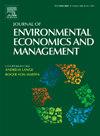碳许可银行的一般均衡方法
IF 5.5
3区 经济学
Q1 BUSINESS
Journal of Environmental Economics and Management
Pub Date : 2024-11-22
DOI:10.1016/j.jeem.2024.103076
引用次数: 0
摘要
我们研究了碳许可银行在 2050 年前向气候中性经济过渡期间的一般均衡效应。为此,我们建立了一个环境动态随机一般均衡模型,在该模型中,企业部门受通用排放交易体系(ETS)的监管。企业有权将未使用的许可证从一个时期转移到下一个时期(银行业务),但禁止反向转移(借贷)。允许正向银行业务为企业提供了在商业周期中平滑许可证需求的机会。受欧盟最近的排放交易计划法规启发而产生的应用强调了许可银行在影响政策结果方面的关键作用。例如,与改革前的预测相比,2023 年的上限改革将导致许可银行业务和碳排放量的大幅减少,以及碳价格 40% 至 50% 的增长,而到 2060 年,GDP 不会有实质性的额外损失。重要的是,如果在评估上限政策时忘记许可证银行业务,将导致对宏观经济总效应的严重低估和对碳排放轨迹的不准确表述。本文章由计算机程序翻译,如有差异,请以英文原文为准。
A general equilibrium approach to carbon permit banking
We study the general equilibrium effects of carbon permit banking during the transition to a climate-neutral economy by 2050. To this end, we develop an environmental dynamic stochastic general equilibrium model, in which the business sector is regulated by a generic emission trading system (ETS). Firms are authorized to transfer unused permits from one period to the next (banking), but the reverse direction (borrowing) is prohibited. Allowing for positive banking gives firms the opportunity to smooth their permit demand along the business cycle. Applications inspired by recent European Union-ETS regulations underscore the critical role of permit banking in shaping policy outcomes. For example, the 2023 cap reform would result in a more significant reduction in both permit banking and carbon emissions, as well as a 40 to 50 increase in the carbon price compared to pre-reform projections, without substantial additional GDP loss by 2060. Importantly, forgetting about permit banking when assessing cap policies would lead to both a significant underestimation of the total macroeconomic effects and an inaccurate representation of the carbon emission trajectory.
求助全文
通过发布文献求助,成功后即可免费获取论文全文。
去求助
来源期刊
CiteScore
8.00
自引率
4.30%
发文量
91
期刊介绍:
The Journal of Environmental Economics and Management publishes theoretical and empirical papers devoted to specific natural resources and environmental issues. For consideration, papers should (1) contain a substantial element embodying the linkage between economic systems and environmental and natural resources systems or (2) be of substantial importance in understanding the management and/or social control of the economy in its relations with the natural environment. Although the general orientation of the journal is toward economics, interdisciplinary papers by researchers in other fields of interest to resource and environmental economists will be welcomed.

 求助内容:
求助内容: 应助结果提醒方式:
应助结果提醒方式:


